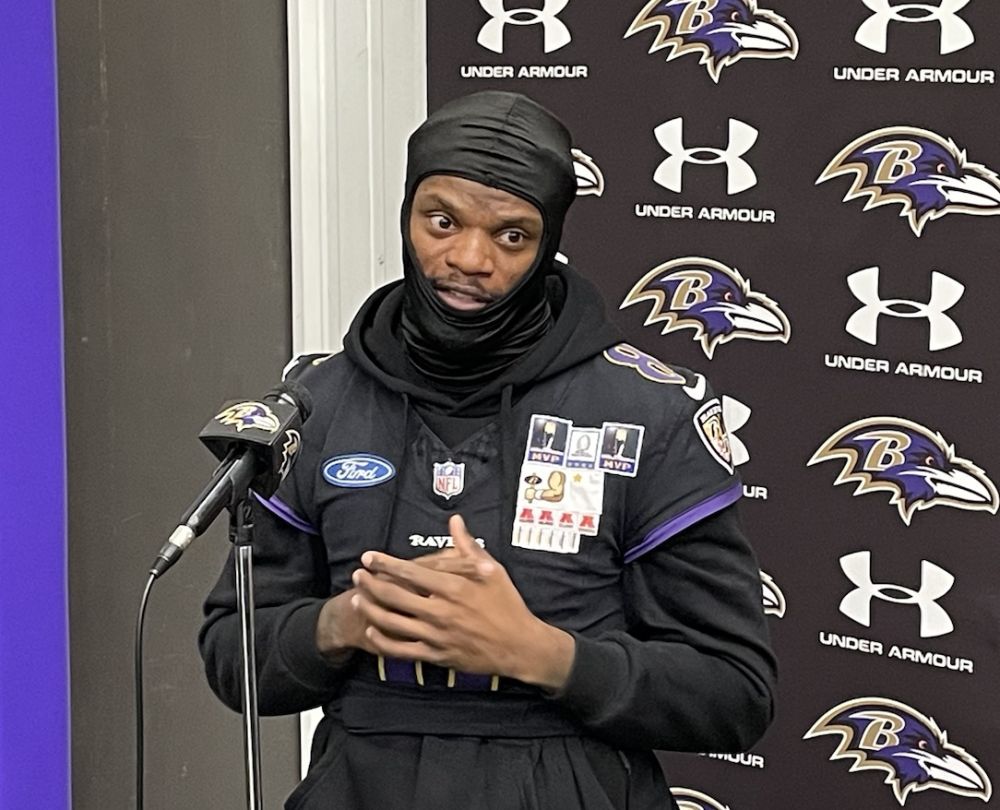BALTIMORE — Lamar Jackson was once again Superman, setting NFL records and shredding the Miami blitz that embarrassed him and the Ravens last season.
Rashod Bateman looked like a No. 1 wide receiver with a career-long 75-yard touchdown catch and a career-high 108 receiving yards. All-Pro tight end Mark Andrews added 104 receiving yards and a touchdown of his own, giving Baltimore quite the pass-catching duo.
Jackson’s career-long 79-yard touchdown run in the final minute of the third quarter felt like the exclamation point for a purple party that had started with Devin Duvernay’s 103-yard touchdown on the opening kickoff return. A 35-14 lead with 15 minutes to play prompted a win probability of just under 99%, according to ESPN.
But Superman needed some help to close, something at which the Ravens failed miserably in one of the worst defeats of the John Harbaugh era. Baltimore hadn’t blown a 21-point lead to lose a game since 1997, but Kordell Stewart and Pittsburgh needed nearly three quarters to complete that comeback at Memorial Stadium. Tua Tagovailoa and the Dolphins erased the three-touchdown deficit in roughly 10 minutes.
Such a collapse — especially at home — calls into question what was supposed to be the identity of this football team beyond relying on Jackson’s heroics.
Health challenges at cornerback or not, the performance of the defense was reminiscent of those bad Ravens teams torched by Jacksonville quarterback Mark Brunell and wide receivers Jimmy Smith and Keenan McCardell in the late 1990s. Dolphins receivers Tyreek Hill and Jaylen Waddle are special talents, but a secondary with so much invested at the safety position in particular — top cornerback Marlon Humphrey did miss a sizable portion of the final quarter — should never allow the ball to go over its head as often as it did.
Facing little pressure in the pocket for most of the afternoon, Tagovailoa went 13-for-17 for 199 yards and four touchdown passes in the fourth quarter alone. Three of those scores came on third down, including Hill’s touchdowns of 48 and 60 yards.
“That just can’t happen. That’s not OK,” Harbaugh said. “I don’t care who’s back there, what they’re doing. Those plays will cost you a game when you have a lead like that. You can’t have miscommunication. You can’t have a guy running a post behind Cover 3. Those kinds of things can’t happen.”
But they did, and the Dolphins snatched victory from the jaws of defeat.
It’s going to be a long week for new defensive coordinator Mike Macdonald.
The Ravens defense owns the overwhelming share of the blame for Sunday’s loss, of course, but the offense isn’t beyond reproach as an unsettling trend continued. For the second straight week, no one other than Jackson could run the ball as Baltimore was particularly miserable in short-yardage situations. That reality cost the Ravens a touchdown on their first offensive drive of the game and prevented them from ever coming close to draining the clock and closing out a victory in the fourth quarter like they’ve done so many times in recent years.
Not including the final Hail Mary, the Ravens ran 10 plays where they needed one yard for a first down or touchdown. They converted three of them.— Luke Jones (@BaltimoreLuke) September 18, 2022
After Miami made it a 35-21 game with 12:12 remaining, the Ravens looked like they’d get into their four-minute offense after Jackson’s 26-yard completion to Duvernay and a completion to Andrews to set up second-and-4. But Kenyan Drake ran for only one yard, and Jackson followed that with unsuccessful runs on back-to-back plays to turn it over on downs to Miami on its own 41.
Following another Dolphins touchdown that closed the gap to 35-28, the Ravens ran once for minus-two yards and were unsuccessful throwing on second- and third-and-12 with Jackson nearly throwing an interception that almost certainly would have been returned for a touchdown on second-and-12.
And after all but abandoning the run when Miami tied the game with 5:19 to go, the Ravens had to settle for a 51-yard field goal and left 2:18 on the clock for Tagovailoa and the Dolphins to ultimately win the game.
In crunch time, Baltimore couldn’t do it with the pass alone.
In a Greg Roman offense, Baltimore runners not named Jackson have gained 82 yards on 31 carries over the first two games of the season. And most of Jackson’s rushing success is thanks to that 79-yard score with the quarterback gaining just under 4.1 yards per carry on his other 14 attempts.
“It’s not the Ravens of the past no more. This is the NFL. It’s a new era,” said Jackson when asked about the offense’s difficulty running the ball. “We’ve got to play ball. We’ve got to know that if the passing is working, we’ve got to keep passing it if we’re doing it. We had some success running the ball because we did score on the long one … but we’ve just got to finish.”
Such an explanation would make more sense if this weren’t a Roman-led offense and the Ravens hadn’t drafted a center in the first round and two more tight ends in the fourth round in an effort to return to their 2019 roots while doing little to replace former top wide receiver Marquise Brown. Poor defense and not being able to run the ball when the situation calls for it will spell trouble for even the best pass-first offenses. Just ask the Kansas City Chiefs when they’ve struggled to put away opponents despite jumping out to big leads early in games.
You hope the fix is as simple as top running back J.K. Dobbins and left tackle Ronnie Stanley — assuming they look like their old selves — returning in the near future, but the Ravens still managed to run the ball much better than this without them last season, making this start that much more unsettling.
The defense has to be much better than that dumpster fire of a fourth quarter. Even with some health concerns, there were still too many good players on the field to blow that kind of fourth-quarter lead.
As often as Jackson has put his team on his back, a stingy defense and a soul-crushing running game finishing off games have been vital parts of the Ravens’ winning formula these last several years. The utter failures in those areas cost them a game they had no business losing on Sunday.
It leaves one wondering about the Ravens’ identity for a new season.
Sometimes even Superman isn’t quite enough.






















